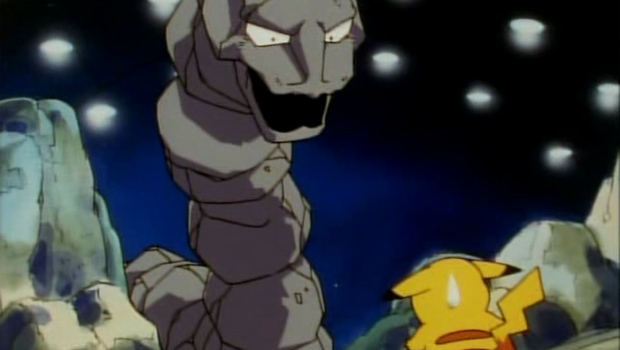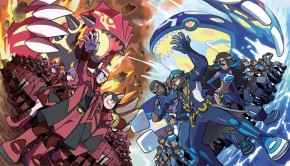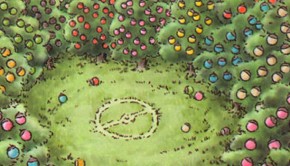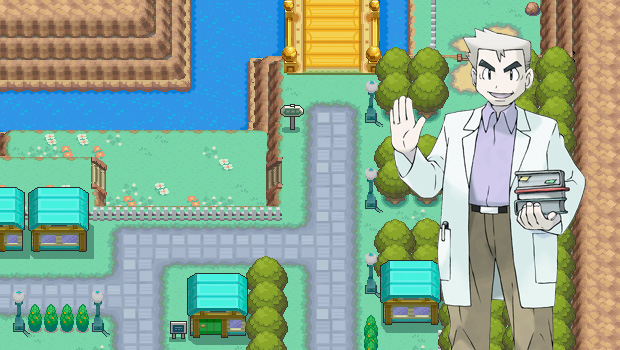Three Habits of Ineffective Players
Competitive Pokémon is a game that has been growing rapidly, with Regional and National Championships in North America and Europe having as much as a 300% increase in participation from last year. One of the effects of this growth is a larger field of increasingly competent players, and as such, becoming an effective competitive player is more difficult.
How does a player become more effective? One way to go about it is to think about what ineffective players tend to do, and to do the opposite of those things. It’s true that you may be able to find success even if you do practice the three habits outlined in this article, and indeed, some players have in the past. However, choosing to become more effective by rejecting these habits can only make you a better and more consistent player.
Not Utilizing All of Your Available Options
Many of you may have read Sirlin’s article on what makes a competitive game player a “scrub”, but if you have not, the gist of the article is that ineffective players will put arbitrary limits on what techniques or strategies they will use because they consider those strategies “cheap” or “unfair”. This is especially egregious in Sirlin’s field of expertise, fighting games, given that the format of the games themselves promote competition against others above all else. However, the attitude of these “scrubs” actually seems to be encouraged in the Pokémon games with its message of putting love and trust in your favorites to win. This attitude is further encouraged by a fandom that often has a healthy disdain for “overused” Pokémon like Kangaskhan and Talonflame, due to their perception as overpowered, overly common, or uncreative.
In a casual setting, there is no problem with limiting yourself to your “bros” or to not using Pokémon you feel are overpowered or uninteresting. However, given that you are on this site and reading this article, I’m assuming that you are interested in competitive battling, where your primary goal should be winning. Placing arbitrary limitations, like deciding not to use Kangaskhan because you perceive it to be broken, will not help you achieve your goal of winning. In fact, as Sirlin points out in his article, this arbitrary limit can often be a bad thing. Refusing to use certain Pokémon on principle is a good way to get absolutely trounced by them, especially given that many of the popular targets of scorn in the metagame are some combination of powerful, bulky, and speedy. Practicing with these Pokémon is an excellent way to understand how to defeat them, and an effective player takes advantage of this practice to better understand and even help develop the metagame. You don’t necessarily need to use a team of “The Big Six” in tournaments in order to do well, but understanding what popular threats can do is a big part of what makes a player effective.
Somewhat related to this is the idea, especially pervasive in the Pokémon community, that creativity is the most important part of team building. It may be tempting to build your team in a way that allows you to use a more “creative” Pokémon over a more standard one, and creativity certainly has its place. When all is said and done, though, you do not get CP or tournament wins for style points. To be an effective team builder, each Pokémon choice must be the most effective one for the role you want that Pokémon to fill. Ray’s Wigglytuff is a great example of an effective but creative Pokémon choice, as he felt it fulfilled the role he wanted for that slot in his team more effectively than anything else. While there was novelty value in using Wigglytuff in a competitive setting, especially in the North American metagame at the time, Ray put more weight on Wigglytuff’s effectiveness on his team than on its creativity as a Pokémon choice.
Complaining About Luck
Unlike many other competitive games, Pokémon has a large reliance on luck. Unlike in a fighting game when you are guaranteed to do the same amount of damage each time you execute the same attack, or in an RTS where your units will always cost the same and will always provide the same damage output at the same level of upgrade, your Pokémon’s damage output (or whether or not your Pokémon even gets to act) is determined by the RNG. As a result, there will be times where a seemingly sure victory is taken away by the unlikeliest of outcomes occurring. It’s only natural for a player to pinpoint the RNG as the reason for losing. However, there are three reasons why an effective player does not blame the RNG in their losses.
The first of these reasons is a simple understanding of the game itself. Pokémon, like poker, is first and foremost a game of probability management. Before you even begin battling, you must select a team of Pokémon based in part on what you are likely to see in a tournament setting. You then must select moves for those Pokémon, and part of this process is deciding whether or not a move’s accuracy is worth a drop in power, or vice versa. Then, once you are in battle, you choose your actions based on what you think is best given your position and your opponent’s position at the time. Every single one of these considerations involves some sort of probability management on your part, whether it’s picking a Pokémon that counters a popular threat, choosing to use a move that nets you a KO you’d otherwise miss with a weaker but more accurate move, or fishing for the flinch in the midst of battle because that seems to be your best move. An ineffective player may blame a loss on what they view as a critical Hydro Pump miss, but does not acknowledge things that were in their control that may have also influenced the battle. It’s obviously heartbreaking to miss on a move that would have won you the game (or to be flinched before you can even get the move off), causing you to lose, but your position was not as good as you thought it was if counting on an inaccurate move to hit was your best option. An effective player, in contrast, will choose more consistent options in order to dictate field position, and if their best play is to use an unreliable move, then they will not complain if that move happens to fail or miss. They knew that there was a chance that their move choice would not pan out, but they still made the choice knowing that it was the correct move.
The second reason for not complaining about the RNG is that, like complaining about “overpowered” Pokémon, doing so prevents you from learning and improving as a player. It’s easy to get fixated on the RNG not going your way and claiming that as the reason why you lost. However, doing this prevents you from examining the rest of your game. What if you could have made a different play three turns earlier and improved your position enough that you wouldn’t have to rely on not getting flinched to win? There are many different variables at play in a Pokémon match, and to single out something outside the realm of your control and claim that as your reason for losing means you are ignoring those things that were in your control — things that you can learn from. An effective player will try to learn from their mistakes, rather than blame the RNG for not acting in their favor.
The last reason for why you shouldn’t complain about “hax” is a more human one. Much like refusing to shake an opponent’s hand before a match or saying “gg” before the game is over when it seems like you are about to win, complaining about the rolls the RNG gives you is poor sportsmanship. It is human nature to attribute your successes to your own ability and your opponent’s successes to luck, but by removing the other player’s agency you are invalidating your opponent as a player. Granted, you are playing competitive Pokémon to win rather than make friends, but being a jerk is a good way to deny yourself practice partners or other sources of feedback on your own game. It’s even possible for you to lose a match you’d otherwise have won if your bad manners are deemed by judges to cross the line into harassment. In a community such as this one, I’d recommend being a gracious loser, if only because it means that it will make other people more likely to want to help you out.
Going on Tilt
In the game of poker, there is a concept called “going on tilt”, which means that as you lose, your mental state becomes more frantic and it becomes harder for you to make logical or safe plays. This concept easily transfers over to the game of competitive Pokémon. It’s normal for any player to get upset when they lose, especially if they feel the loss is outside the realm of their control. It’s how you react to this feeling that helps determine whether or not you’re an effective player. An ineffective player will allow their anger to fester in their mind and poison their ability to think critically in their next game, which will in turn lead to a higher probability of losing, sparking an even stronger reaction and making it even harder to think critically. This creates a negative feedback loop that makes it hard for that player to play at the top of their game.
How does an effective player avoid going on tilt? In an online tournament setting, it’s simple enough to just get up and walk away for a cooldown period. Spending a half hour or more doing something else in order to “reset” your frame of mind is effective and easy. However, in a live tournament setting you are not afforded this luxury, and effective players have to come up with other ways to avoid going on tilt. Some players may briefly reflect on what they could have done better in their losses, and then mentally move on to the next match without dwelling on their loss in the previous one. Meditation or some other way of taking yourself out of the tournament briefly may also be helpful. There’s something to be said for just taking a few deep breaths and counting to 10 when you’re angry over a loss.
Conclusion
In order to become an effective competitive Pokémon player, a competitor must avoid placing unnecessary restrictions on themselves, and instead explore all of the options available to them. They must also realize that the RNG may not always work in their favor, but that the ultimate responsibility for their results is with the choices they make at all points of the team building and battling processes. Finally, an effective player keeps their cool, not dwelling on losses and allowing those losses to affect their performance in the rest of the tournament. There are many other factors dictating what makes a player effective or not, and it’s possible to succeed even if a player doesn’t always adhere (or even never adheres) to the three habits listed above. However, making a habit of these three things is relatively easy, and will almost certainly lead to an improvement in play for the player who implements them.
41 Responses to Three Habits of Ineffective Players
Leave a Reply
You must be logged in to post a comment.











Sorry, but I’m not sure if I really see the validity of your point here. Accuracy is only one of many aspects of a Pokemon, and I think the problem with your POV on this is that it’s really biased. Accuracy is a more direct and random trait that specific Pokemon exhibit, which is why it’s so easy for you to label Rotom/Venusaur/whatever as unreliable when it’s so easy to miss that those same Pokemon also have smaller and more subtle advantages in other areas. It’s easy to remember when an Overheat miss screws you, yeah, but how many instances can you remember when Rotom-H’s other pros helped you win games?Rotom does a lot of smaller things that make it so good but they’re hard to notice, but if it misses every now and then, the effect is more direct. Thus, you remember it, but it doesn’t mean Rotom’s accuracy outweighs its strengths. I’ll take getting 100 things right and getting 10 things wrong over getting 50 things right and zero things wrong, for lack of a better example.
Also, if you’re putting yourself in a position where imperfect accuracy moves constantly cost you games, that’s on you. If you’re expecting imperfect accuracy moves to hit more times than statistically probable, that’s also on you.
Lastly, don’t let your experience at one tournament affect your judgment. Anything can happen is such a small sample size.
Something I changed in my game to try and avoid tilt is to go at my match one turn at time. Each turn I ask myself what the best play is and what my opponent might want to do. My choices become more logical and I over predict much less.
It helped me at least keep my focus and not snowball away with a loss or surprise KO. My game has improved since 2013, and I really think this methodology is one of the reasons I’m doing a lot better.
Awesome article, I think I will be incorporating these into my coming years as an introductory player. 😀
I don’t know if it’s because of this article that people have started to become acquainted with the phrase, but just to clear it up, going on a losing streak doesn’t mean you’re on tilt. The article suggests to avoid it and to walk away for a little bit if it happens, but this does not mean you should take time off every time you lose.
This is especially important when you’re grinding during practice. If you’re someone who can control your emotions pretty well, feel free to play for hours after you’ve had miserable outcomes for a stretch of games. Cooling down is only really needed if your emotions are affecting your in game decisions.
Great article, possibly the best one I’ve ever read. I feel this explains a lot of situations that I’m sure a lot of people go through and gives logical explanations on how to compose yourself when you are in these situations. Great read, 10/10
I have heard from a few people this seems to be happening a lot, so maybe it’ll be useful for me to help clarify for this a little:
Losing repeatedly does not necessarily mean you’re titling. Reacting improperly to losing means you’re tilting. If the way games earlier in your session went are negatively impacting your play, you are on tilt. Pretty much everyone who rages on PS! is probably tilting, for instance, since pretty clearly the game is getting to them and they are almost definitely playing worse as a result. Since Pokemon is almost never a single elimination game anymore, one of the skills you need to be successful is to recover effectively from losing, or in other words to avoid going on tilt, because even in tournaments you win or do very well in, you are going to lose some games.
When practicing, the idea of not tilting tends to tie in a lot with having an attitude that will help you improve. To tie in with another of the points in the article, if after every loss you’re blaming the moves your opponent made or the RNG, you’re both probably tilting and probably not getting anything out of practicing, because your mental state is preventing you from actually improving. Losing repeatedly itself doesn’t mean you’re tilting — in fact, I think most players would agree losing in practice is much more valuable than winning most of the time if you are reacting to it correctly. If you don’t tilt every time something doesn’t go your way, you’re going to get a lot more out of your practice if you can power through the losses and learn from them. It isn’t just rude to make dumb comments during battles about the RNG or your opponent’s play/team: it’s probably actually causing you to get less out of your practice. There’s a lot of reasons why you can lose a game, and if you want to understand why you lost and eventually lose less as a result, not blaming the wrong factors for your losses or losing the games to begin with because you’ve let previous games fluster you is really important.
It’s a little different in real events. I know a lot of people like to just forget about the previous round and move on. I don’t: I tend to need to understand why I lost to try to convince myself I won’t make the same error(s) in a subsequent round to be able to put losses away, so I’d rather think about them a bit more before I get into my next round. However, I feel like I get a much larger than normal amount of players who tell me about their losses after rounds at Regionals or whatever, and I think almost all of them would be better served to just forget about their previous round, talk about other things between rounds, and try to get to the next round feeling a little more refreshed. I can almost always tell by the way people tell the story: if you’re still upset when you’re telling a story about a previous round, you probably aren’t ready for the next one. This is the sort of thing that’s probably worth calling your friends on — I think a lot of people tend not to realize how shaken up they get sometimes, and then it snowballs against them before they react to it and they have a quick 2 or 3 in the L column. I think everyone kinda needs to figure out what they need to do to readjust after a loss, but it all comes down to thinking about the round you’re in when you’re playing it and not having the previous rounds lingering over you, either because you’re still thinking about them or because they’ve flustered you enough that you aren’t playing the way you were in the round before. For most people, I think figuring out what went wrong is better done after the tournament rather than during it, but I think like anything else it’s about knowing how you operate and what works best for you.
complaining loudly and not taking accountability for what happened in previous rounds is probably not what works best for you regardless of what you think
I have to say, I’m guilty of trying to have the perfect team. XD
pretty good, sadly the tilt part’s one of my problems (and it’s hard when you’re an aspie since frustration triggers this big time). Problem with my state is I’m the kind of person who sadly seeks “instant-success”
I think something that could be expanded on a bit is what “probability management” means. It’s why the Singles community, sadly, has gotten so inbred about banning cheap-this and broken-that. You could relate to a number of other things here: how the strive for “perfectionism” can lead to greater flaws as others have stated, looking back on your individual plays and analyzing your decisions to sef-improve, or avoiding going on tilt.
Too many people focus on the end result of a battle, win or lose, rather than the journey. But rarely is there a path to 100% victory until the waning turns of a battle. Sometimes you can do everything right and still come out on the wrong end because a few high-probability rolls didn’t go your way. For example, straight Swagger spam isn’t infuriating because it’s particularly effective. It’s annoying because it specifically invokes the RNG gods to throw a low-probability bone their way… and it sucks when everything lines up perfectly wrong and you lose to it. While you still want to look back and see if there’s room for improvement in the factors you can control, your team doesn’t necessarily have a glaring flaw in it. All your decisions may have been fundamentally sound and mathematically correct. Sometimes, you just have to realize the rolls didn’t go your way and move on.
Also I will addend to rapha/Scott as someone who probably rages a little harder than they should sometimes (but have done a good job of improving over the past year-ish), though I understand many people can’t it isn’t impossible to divorce the immediate emotional reaction from the strategics. Nonetheless, aside the obvious social implications, raging also puts unneeded stress on one’s body and is simply time wasted on an unproductive activity. A little venting can be healthy, though, and not be confused with the aggressive outward anger that typically defines “raging.” Be a sounding board for your friends when they’re having a bad time and don’t call out strangers if the worst thing they did was walk away silently with a scowl on their face.
First and foremost, I’ve got to say this is an excellent article, especially as the psychological and mental sides of the game are less documented, but arguably are an integral part of playing itself. I think the way its presented and the discussion constructed is very logical and easy to follow, which given the subject matter can at times be rather difficult.
On a personal level, I can relate to this as I’ve suffered certainly succumbed to two of the three points described in the article, with regards to complaining about luck and tilting. However, I’d like to think that on these two points I’ve improved in being able to control not only the emotional side of things, but also the way I approach it when it happens. One of my main changes is I’ve gotten into the habit of chatting with another person about battles as a way of being able to articulate where either a poor decision might have cost me the match, or trying to decipher a particularly clever play. I will usually do that with either a friendly source, or if its someone on the forums perhaps after a live event, the opponent themselves to see how they viewed the battle. I know mentally I can be somewhat fragile to dealing with poor runs of form so I use the discussions as a way of being able to re-enforce good practices.
As someone who has played Pokémon for almost 16 years, but is new to the competitive side (as well as this site), this article was extremely helpful to me. I like to think that I’ve learned quite a bit form it, and I appreciate the OP posting it for us!